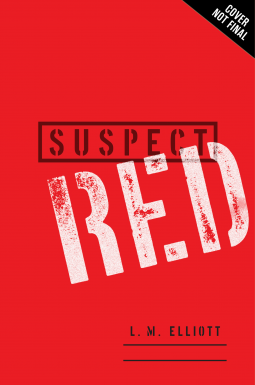
Laura's Blog

Coming September 2017: SUSPECT RED
April 17, 2017

"We must not confuse dissent with disloyalty. We must remember always that accusation is not proof and that conviction depends upon evidence and due process of law. We will not walk in fear, one of another. We will not be driven by fear into an age of unreason, if we dig deep in our history and our doctrine, and remember that we are not descended from fearful men--not from men who feared to write, to speak, to associate, and to defend causes that were, for the moment, unpopular.”
--Edward R. Murrow (one of my personal heroes!)
I grew up just outside Washington, DC during the height of the Cold War—learning about the world and its politics through the prism of the Soviet Union’s brutal oppression of its people and “satellite” block nations, Vietnam, and Watergate. It was an uncertain, scary time to be a kid. When my editors at Hyperion approached me about my next book, one of the ideas I ended up circling around was the early 1950s—when the post-WWII standoff between us and the Soviet Russians, the new atomic arms race, Stalin’s “Iron Curtain,” and the Korean War spawned the Red-Scare.
McCarthy's fear-mongering rhetoric and hunt for “subversives” and hidden “Reds” had the nation paranoid and skittish, pointing fingers of accusations at one another, and looking over our shoulders constantly. The era is little talked about these days, other than the blacklisted Hollywood Ten, and felt like an important historic mirror to hold up for us to look into. The idea took hold, and thus, SUSPECT RED was born—a look at how national trends, anxieties, and distrust fermented by our leaders and celebrities can seep into the hearts and minds of ordinary citizens and change how we treat one another.
Each chapter in SUSPECT RED begins with actual news clips and photos of that month’s events, starting with the execution of the Rosenbergs for espionage, June 1953. The novel follows a year in the life of Richard, a high-schooler whose father works for the FBI. It opens with his Mom fearfully taking Robin Hood away from him since the book was banned from public libraries for promoting “un-American,” Communist messages. (The Merry Men took from the rich to give to the poor.)
Richard’s new best friend is Vlad, a hip, jazz-playing kid whose mother is Czech and whose father works for the State Department—the very agency McCarthy claims is riddled with closet Communists, sympathizers, and “fellow travelers” looking to undermine America or “bleeding hearts” who won’t recognize a threat. As the teenagers write songs together, discuss their favorite—often controversial—new books, deal with school bullies, and play on the basketball team, Richard begins to wonder if Vlad's family might have ties to the "Reds" in Eastern Europe. He has to decide between his loyalty to his father, who is a WWII veteran and patriot as well as an FBI G-man, or his newfound friend, who has so expanded the shy Richard’s world.
SUSPECT RED is a story about family and friendship, the father-son bond, the loyalty and competition between siblings and best buddies—the stresses, failures, and redemption that can be found in those defining relationships. It also is a coming of age journey for a boy finding his way in a complicated world, a look at the devastating power of rumor. And for once, book-readers are heroes and cool!
Ultimately, SUSPECT RED asks the primary question: when the nation is scared, who do you believe?
Where is the appropriate line between protecting national security given very real threats while also protecting individual rights, liberty of thought, speech, and religion? How do we learn to see reasonable opposing views as simply different rather than dangerous or “disloyal?” As always, I was fascinated by how large national movements or events shape the day-to-day life of an average person—what choices does he or she make when faced with extraordinary pressures—in this case to conform during a time of genuine international crises?
For the teachers who read my blog, SUSPECT RED provides a natural contextual tie-in to English literature canon, works like The Crucible, Catcher in the Rye, Fahrenheit 451, Lord of the Flies, and Invisible Man, all written during the reign of McCarthy. These works were incredibly daring and often brought their authors censorship, blacklisting, and persecution by McCarthy’s Senate investigation. We forget that the careers and lives of thousands of Americans were destroyed if they were brought before loyalty review boards, the House UnAmerican Activities Committee (HUAC) or McCarthy’s committee, or just scrutinized and publicly criticized by local neighborhood watchdog committees.
Many a librarian and teacher were forced from their jobs for teaching “subversive” literature. Miller, for example, was denied a US Visa to travel to Brussels for a premiere of The Crucible, “under regulations denying passports to persons believed to be supporting the Communist movement, whether or not they are members of the Communist party.” Adding this political overlay onto Miller’s play of the Salem witch-hunt certainly deepens its themes decrying pack-mentality.
And while it was not my original intent, SUSPECT RED provides a historical parallel to some of today’s issues. (Fear-mongering, xenophobia, bully-politics, labeling, name-assassination, unsubstantiated accusations, “alternative truth,” fake news, and social-media character-smearing campaigns.) Sometimes history provides the safest, arms-length vehicle for allowing young people to discuss current issues that trouble them with the goal of helping them know how to tease out fact and then decide for themselves what they believe—conservative or liberal, their OWN thoughts.
This book was an exciting challenge to research and write--I hope you enjoy it!
I am in the process of building my resource page to provide “a walking tour” of the 1950s and the real life people who make appearances in this book—McCarthy, FBI director Hoover, LBJ, Nixon, and Edward R. Murrow to name a few. Stay tuned!

Other Blog Posts
Click Here to See All of Laura's Blog Posts
